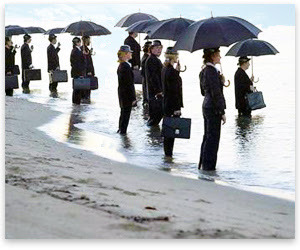Capitalism Fixes Problems & Preserves Democracy: Capitalism is what we should be relying on to fix our problems.
Capitalism has its own ecosystem, just like biology's ecosystem. An economic
ecosystem that weeds out the weak has parasites that eat the failures and new
bacteria that evolves and grows replacements for that which failed. A system
that keeps everything in balance.
The problem is we are no longer a capitalistic society. What we were taught
in school is now utter and absolute nonsense. Capitalism is a thing of the
past.
As outlined in "It's Not A Financial
Crisis - It's A Stupidity Crisis", we
created two back to back bubbles. The air out of the Tech Bubble was sucked up
for fuel by our next stupidity crisis: The Housing Bubble.




















